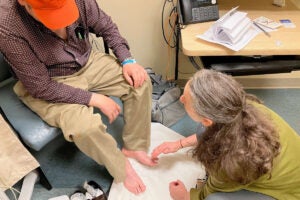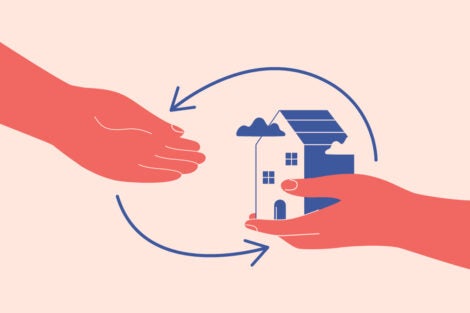Harvard T.H. Chan School of Public Health’s pilot homelessness initiative seeks to address one of our nation’s biggest crises by focusing on what works.
October 6, 2023 — When Howard Koh was Massachusetts’ public health commissioner two decades ago, he watched in horror during a brutally cold January as 13 homeless people literally froze to death on the streets of Boston. “I’ll never forget it—there was tremendous media attention about every death. Outraged advocates stormed state government and demanded to know who was responsible for responding to the crisis and what we were doing to address it,” remembers Koh, Harvey V. Fineberg Professor of the Practice of Public Health Leadership at Harvard Chan School.
The answer, he learned, was no one and nothing. “There was no system, no responsible entity, no dedicated office,” he says. So Koh urgently established and chaired an emergency task force, supported by a coalition that included his longtime colleague Jim O’Connell of Boston Health Care for the Homeless Program (BHCHP), to deal with the immediate problem of cold exposure. But the larger issue of homelessness has persisted since then, receiving inadequate attention. Even as Koh became U.S. assistant secretary for health in the Obama administration, he was troubled that national efforts failed to coordinate a system between hospitals, housing officials, mental health professionals, and the prison system. “This crisis has haunted me for decades,” Koh says. “Why isn’t there more of a unified governmental and societal effort around confronting and preventing this unacceptable problem?”

After returning to Harvard Chan School, Koh helped establish a pilot program in 2019 called the Initiative on Health and Homelessness—the first of its kind at a school of public health. “This is my highest priority these days,” he says. Its steering committee includes O’Connell, along with Senior Associate Dean Nancy Turnbull, and faculty members Karen Emmons and Natalie Slopen. “Academia regularly tackles complex, seemingly intractable health challenges—HIV/AIDS, cancer, and COVID-19, for example—to heighten societal attention, advance understanding, and offer options for evidence-based policy action,” Koh and colleagues wrote in a recent call to action in Public Health Reports. “Yet academia routinely overlooks homelessness, one of society’s most pressing health crises.”
The Initiative seeks to change that by sponsoring a monthly symposium on topics related to health and homelessness, bringing together scholars and advocates, and establishing a course on the issue. It has hosted a national summit on the topic to identify what works, engaged political leaders from mayors’ offices, and created a growing list of national partners. Universitywide collaborations involve the Harvard Joint Center for Housing Studies, the Harvard Kennedy School, and the Harvard Advanced Leadership Initiative.
A devastating public health issue
The modern homelessness crisis began in the United States in the 1970s, spurred in part by the deinstitutionalization of the mentally ill in the preceding decades. An estimated 600,000 people now experience homelessness on any given night. At root is a lack of affordable housing. In 2020, 46 percent of renters paid more than 30 percent of their income for rent, with 23 percent of renters paying more than half, according to the Pew Research Center. That has led to a situation, according to the National Low Income Housing Coalition, in which for every 100 “extremely low-income households” only 36 units of housing are available. As a result, homelessness has had a devastating impact on health, with unhoused people facing a life expectancy several decades less than the general population, and up to half of the people experiencing homelessness also having several mental or substance abuse disorders.

As clinicians with BHCHP for more than a decade, Maggie Sullivan, DrPH ’19, and Jill Roncarati, MPH ’07, SD ’16, have seen firsthand the host of health problems affecting the unhoused population, including increased spread of communicable diseases, risk for domestic violence, and difficulty adhering to prescribed medications. “Everything you see is more extreme,” says Roncarati, a research scientist with the Center for Healthcare Organization and Implementation Research (CHOIR) at the U.S. Department of Veterans Affairs and an instructor at Harvard Chan School. “But because of the demands of just seeing to daily necessities, health takes a back seat to other priorities.”

In 2020, she and Sullivan launched a six-hour nanocourse at the School investigating health and homelessness. “This was not a conversation that was happening,” says Sullivan, now an instructor and health and human rights fellow at the School’s FXB Center for Health and Human Rights. More than 70 students signed up for the first course offering, and with support from the Initiative, it has grown into a full-length course, covering topics including demographic trends, the impact of structural racism, and unique challenges facing veterans and families. “There is an appetite for this now we haven’t seen before,” Sullivan says.
Roncarati, who also works at the VA Bedford Healthcare System, has conducted studies looking at the impact of homelessness. In one 2018 study published in JAMA Internal Medicine, for example, she and others found that among the population of adults in Massachusetts who eschew shelters, mortality rates were three times higher than those who sleep in shelters and 10 times higher than the general population. At the same time, she says, “it’s extremely hard” to get funding for studies on homelessness, since the National Institutes of Health, the main funder of health-related research, is focused on research into specific diseases, not on social determinants of health.
In addition, it can be challenging to do research on people who are by nature transient. “The population is by definition hard to ascertain and even harder to follow, because they move addresses and contacts and their phones get disconnected,” says Henning Tiemeier, Sumner and Esther Feldberg Professor of Maternal and Child Health at the School. He is one of the few Harvard professors who has conducted research focusing on people experiencing family homelessness, who are mostly women of color and their children, as opposed to those experiencing individual adult homelessness, who are predominantly white men.

Read a personal story about one woman’s experience with family homelessness.
For one study, Tiemeier used a well-known longitudinal study following a population in the Great Smoky Mountains of Tennessee and North Carolina from 1993 to 2015 that included information on housing insecurity. Published this year in JAMA Pediatrics, the study showed that children who moved more than five times in a year had extreme risk for depression much higher than the effect of poverty alone. “We’re not talking just a 10 to 20 percent increase in risk, but nearly doubling,” Tiemeier says. He speculates that the reason is due to the social breakdown that comes with not being able to find stable housing, even with friends or relatives, beyond just the lack of funds. What’s more, the association with depression lasts well into adult life. “Once someone is homeless, this is an indicator that five or ten years down the road they will still need support,” he says.
In another working paper, Tiemeier examined the impact of Boston-based nonprofit Horizons for Homeless Children, which provides early education. He found that children in that program faced significant challenges to vocabulary and educational skills compared to national averages. “It says nothing about the program. This is simply a vulnerable population facing many disadvantages,” he says. If there is any silver lining to the study, it’s that those who enroll in the program at a younger age tend to do slightly better than those who enroll later.
Housing first
The insights that research has provided into the homelessness crisis can be encapsulated in the phrase “housing first.” While it may seem obvious that providing housing is key to ending homelessness, many programs only provide transitional housing or require that unhoused individuals must first be drug-and-alcohol-free. According to the National Alliance To End Homelessness, the most effective solution is “permanent supportive housing,” which studies have shown results in a housing rate of 75 to 91 percent one year after a household is rapidly rehoused.
“You cannot attain health and well-being without providing housing first,” says Andrew Boozary, SM ’14, executive director of the Gattuso Centre for Social Medicine at the University Health Network in Toronto, the largest research hospital in Canada. “Denying people housing is one of the most cruel and ineffective things we have seen in health policy. Chronic exposure to homelessness exacerbates every dimension of physical and mental health.” Of course, providing affordable housing costs money, and communities have explored a variety of ways toward subsidizing it; recent symposia sponsored by the Initiative at Harvard Chan School looked at solutions such as RV parks, tiny homes, so-called accessory dwelling units (otherwise known as “mother-in-law apartments”), and pallet shelters that can be constructed through prefabricated materials in less than an hour.
 Read more about how local governments, agencies, and organizations including BHCHP are addressing homelessness.
Read more about how local governments, agencies, and organizations including BHCHP are addressing homelessness.
Even economically speaking, providing housing makes sense, with studies showing that supportive housing costs an average of around $3,000 a month, as opposed to $7,000 for a shelter, $10,000 for prison, or $30,000 for a hospital stay. “It’s a matter of both social justice and sound economics,” says Boozary, who has led efforts to address health and homelessness in Toronto by helping establish a program that provides housing. Key to the plan are its integrated support services.
“It’s not just getting people into housing that is safe and secure, it’s also helping them with the right support services to help maintain housing,” says Sullivan. This can include mental health and substance use disorder treatment and job training, and peer counseling on elements of living in a home that may not occur to a stably housed person, such as how to grocery shop or pick up a prescription at a pharmacy.
Supportive housing requires coordination between groups both inside and outside government, and the communities that have been most successful at addressing homelessness have built comprehensive coalitions across a broad number of groups. Koh hopes that by raising more funds to turn the School’s Initiative from a pilot to a full-fledged program at Harvard, it can provide advice to communities on evidence-based practices that mitigate suffering. He says, “People experiencing homelessness are regularly stigmatized and dehumanized despite enduring tremendous trauma and terrible losses in their lives.” Quoting his mentor Reverend William Sloane Coffin, he says, “We should care most for those society counted least and put last.”
—Michael Blanding is an author and journalist who writes regularly for Harvard Public Health
Images: Ponornariova_Maria / iStock, Russ Campbell, Courtesy of BHCHP
